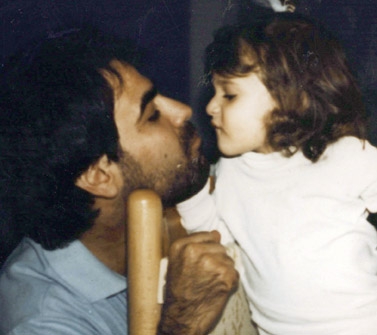I’ve known Barry Kluger for a decade. In all that time, I’ve never once asked him about the details surrounding the death of his 18-year-old daughter, Erica. “People are afraid they might catch it,” he jokes as we lunch at a local North Scottsdale grill. “I remember your license plate,” I tell him. “It was ‘Eri’s dad,’ wasn’t it? Will you tell me what happened?”
He then proceeds to recreate the scene of the tragic accident that took his daughter’s life in 2001. “I know what happened,” he recounts in a lighthearted manner. “She was reaching into her Kate Spade handbag for her Bobbi Brown lipstick and never saw the other car coming. That was Erica.” Kluger checked his phone messages during a round of golf on April 6, 2001. Erica had been in a car accident. He raced to the emergency room of Scottsdale Hospital where he was met by a doctor and a priest. Erica had been dead for an hour. Kluger later learned from one of the firefighters who attended the accident that Erica had been killed instantly. But hospital ERs don’t like to give that kind of information over the telephone. “Especially if you’re getting into a car to rush to the emergency room,” Kluger explains.
While the hours and days after the accident must have passed like a blur, Kluger recounts meeting his wife, Hope, and her family in the hospital parking lot and acknowledges, “I was very calm. I had to take care of everyone.”
He tells me about his choice to not view his daughter’s body at the funeral. “I wanted to remember the last time I had seen her, alive, not dead. I have never regretted that decision.” Kluger delivered a eulogy at his daughter’s funeral, his ease with words offering him an avenue to honor and celebrate his love for Erica.
At times during our lunch I find myself laughing at his witty responses, most of which are clearly well rehearsed. As the president and CEO of the MISS Foundation, a community of compassion and hope for grieving families, he’s become a seasoned orator around issues surrounding the loss of a child. Yet Barry isn’t detached or unemotional. Recounting his tragic loss is still deeply haunting and extremely personal. “Do you mind talking about Erica’s death all the time?” I ask, feeling guilty for making him relive the experience.
“That’s how I stay connected to her,” he tells me, which also explains the beautiful book he published entitled A Life Undone; a Father’s Journey Through Loss. Kluger’s easy-to-read style reflects his genuinely warm, affable personality. He’s the kind of man you just want to hang out with.
At times I find it hard to believe that this endearing, jovial man has suffered the kind of loss he has. The book chronicles the early days of Erica’s life and the agony that followed her death. Through a very personal memoir that includes emails, letters and diary entries, Kluger offers other grieving parents a guide to help cope with similar losses.
In the book he describes the first time he walked into Erica’s bedroom after her death and realized that she was never coming back. Thoughtful, poignant and full of wit and humor, Kluger’s book has helped countless parents wade through the pain of the loss of a child.
But it would be a mistake to judge Barry’s easygoing style as complacency. He’s a man on a mission, and he’s making great political strides to help other grieving parents. When Erica died, Kluger was heading up his own marketing company and had the luxury of taking as much time off as he needed to grieve for his beloved daughter. But most Americans don’t have that privilege. “We give workers 12 weeks off for the birth of a baby and only three days off for a child’s death,” Kluger tells me. After hearing so many stories from grieving parents who had to go back to work almost immediately after losing a child, Kluger partnered with Kelly Farley, another grieving father, to draft an amendment to the Family and Medical Leave Act of 1993.
Currently the act allows for three months of paid time off for new parents or for those needing to care for a sick family member. “But a grieving parent,” says Kluger, “gets no more than three to five days to bury a dead child.” Kluger recounts a story of one woman whose boss came to her child’s funeral and insisted she return to work Monday morning. “It just doesn’t make sense,” Kluger explains. Emotional trauma aside, Kluger insists that the economic impact of grief in the marketplace is staggering. “This is an economic story,” he clarifies. “Death of loved ones accounts for a $52-billion-a-year loss in this country.” He’s got good, sound arguments to support the Farley-Kluger initiative. He’s also gotten more than 60,000 signatures on his parental bereavement petition and a slew of congressional supporters.
“There’s a bill in Congress with Erica’s name on it,” he tells me proudly. “I want to be standing there in the White House behind a hundred other parents, watching the president sign this bill into law.” Kluger expects the initiative, now titled the “Sara Grace-Farley-Kluger Act to face a vote in 2014. “This kind of work in Washington is a marathon, not a sprint,” he says. But Kluger adds supporters on a daily basis and isn’t easily discouraged. “Circumstances brought us in a direction to help people. This is the hand I’ve been dealt. I’m just trying to win the game.”
Barry Kluger is a thoughtful, charming and inspiring man determined to make his life and his daughter’s matter. At the end of our lunch he hands me an autographed copy of his book. I open it to read the personal note he’s written inside the front cover. “When we can take tragedy and turn it into strength, then we’ve accomplished something great. As the Talmud says, ‘He who saves one life is as if has saved the entire world.’
Visit Farleykluger.com to learn more about the Parental Bereavement Leave Act and to join the grassroots advocacy effort to petition change and amend the Family and Medical Leave Act.






